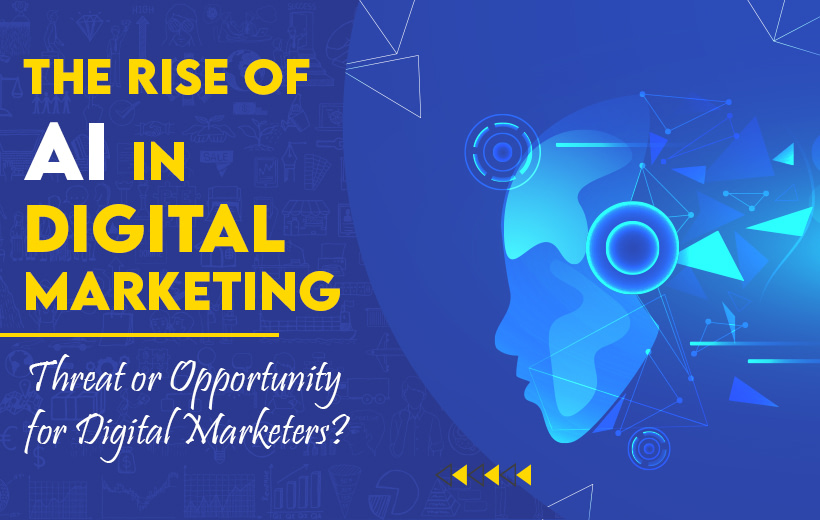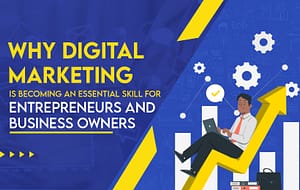AI in Digital Marketing
Artificial Intelligence (AI) has become one of the hottest buzzwords in the marketing industry in recent years. As artificial intelligence (AI) continues to advance, its impact is felt across various industries, including marketing. From automated chatbots to predictive analytics, AI is increasingly being integrated into marketing strategies to improve efficiency, accuracy, and customer experience.AI-powered technologies, such as chatbots and predictive analytics, have become an integral part of many companies’ digital marketing strategies. According to a recent survey by Salesforce, 51% of marketers already use AI, and 27% plan to incorporate it in the next two years. With such rapid adoption, it is essential to examine the impact of AI on digital marketers.
However, as AI becomes more prevalent in marketing, examining the potential impact on digital marketers is important. Will AI ultimately replace human marketers, or will it enhance their abilities and create new opportunities?
In this article, we’ll explore the rise of AI in digital marketing and the potential threats and opportunities it presents for digital marketers. By examining both sides of the equation, we can better understand how to leverage AI for maximum benefit while preparing for potential challenges.
The Opportunities of AI in Marketing
Artificial Intelligence (AI) is changing the face of digital marketing. The rise of AI in digital marketing presents a significant opportunity for digital marketers to enhance their campaigns and improve their results. Artificial intelligence has the potential to revolutionize digital marketing by providing new opportunities for marketers to better understand their audience, improve targeting, and enhance the customer experience. From predictive analytics to chatbots, AI is offering marketers new ways to reach and engage with customers. It can improve customer service by providing instant support and personalized recommendations based on a user’s previous interactions with a company. This can lead to increased customer satisfaction and loyalty.
The opportunities presented by AI in marketing are vast, and savvy marketers are already beginning to incorporate AI-powered tools and strategies into their campaigns. By leveraging the power of AI, digital marketers can gain a competitive advantage by providing better customer experiences, improving targeting and personalization, and ultimately driving better results.
How AI Can Benefit Digital Marketers
Thanks to machine learning and natural language processing, AI is now capable of analyzing vast amounts of data and providing insights that were once impossible for humans to uncover. One of the biggest advantages of AI in marketing is its ability to process vast amounts of data quickly and accurately. For example, AI-powered tools can automatically generate reports, analyze website traffic, and even draft ad copy, allowing marketers to be more efficient and effective. This data can be used to inform marketing strategies and improve decision-making.
Here are just a few ways that AI can benefit digital marketers:
Enhanced Targeting and Personalization: AI algorithms can analyze vast amounts of data on customer behavior, preferences, and demographics to develop more accurate and detailed customer profiles. This, in turn, allows marketers to create more targeted and personalized campaigns that resonate with specific audiences.
For example, AI-powered recommendation engines can suggest products or services based on a customer’s past purchases or browsing history. Chatbots can also use AI to understand and respond to customer inquiries, providing personalized recommendations and support in real time.
Improved Campaign Optimization: AI can also help digital marketers optimize their campaigns for maximum impact. By analyzing real-time data on customer engagement, conversion rates, and other metrics, AI algorithms can identify patterns and insights that humans may miss. This can help marketers adjust their campaigns on the fly and make data-driven decisions that improve performance.
For example, AI can help identify the best times to send emails or social media posts based on when customers are most likely to engage. It can also help optimize ad targeting and bidding strategies to maximize ROI.
Streamlined Workflows and Processes: AI can automate many routine marketing tasks, freeing up time and resources for more strategic activities. For example, AI can automatically generate and optimize ad copy, create personalized landing pages, and conduct A/B testing to determine the best design or messaging.
By automating these tasks, digital marketers can focus on higher-level strategy and creativity, while AI handles the heavy lifting.
Overall, AI offers digital marketers a powerful set of tools to create more effective, personalized, and efficient campaigns. While there may be some challenges and limitations to adopting AI, the benefits are clear, and savvy marketers will need to embrace this technology to stay competitive in the years to come.
Examples of industries already impacted by AI-driven automation
Industries across the board have already experienced the impact of AI-driven automation, and marketing is no exception. For example, e-commerce sites have leveraged AI-powered chatbots to improve customer service and increase sales. The financial industry has utilized AI algorithms to automate fraud detection and enhance security measures. In the healthcare industry, AI has been used for personalized patient care and improved diagnostic accuracy. These industries have seen the benefits of AI’s ability to process large amounts of data quickly and accurately, automate routine tasks, and make predictions based on patterns and insights. While the impact of AI on these industries has led to increased efficiency and productivity, it has also raised concerns about the displacement of human workers. Digital marketers may face similar challenges as AI technology continues to advance, making it important to explore ways to balance automation and human expertise in the digital marketing industry.
Potential negative impacts of AI on digital marketers
The increasing role of AI in marketing has brought a lot of opportunities for digital marketers. However, it’s important to examine the potential negative impacts of AI on the industry.
One of the most significant threats of AI in marketing is the potential for job displacement. As AI-powered automation becomes more prevalent, certain tasks that were previously performed by humans could be replaced. For example, chatbots can now handle many customer service inquiries that were previously handled by human agents. Similarly, AI can be used to automate tasks such as ad targeting, content creation, and data analysis.While AI can help automate certain tasks, it may not be able to replicate the unique insights and ideas that come from human expertise.
Balancing AI and Human Expertise in Marketing
While AI offers many opportunities for digital marketers, it’s important to recognize that it’s not a panacea. Like any tool, it has its limitations, and there are certain tasks that it may not be well-suited for. Moreover, as AI becomes more prevalent in marketing, there is a risk that it may lead to a loss of the human touch that is so important for building connections with customers.
So how can digital marketers balance the benefits of AI with the value of human expertise? One approach is adopting a hybrid model that integrates AI and human creativity. Here are some ways marketers can do this:
-
- Recognize AI’s limitations: While AI can be incredibly powerful, it’s important to recognize that it’s not a replacement for human creativity and intuition. There are certain tasks that AI may struggle with, such as developing truly original and creative ideas or adapting to sudden changes in market conditions. By acknowledging these limitations, marketers can ensure that they don’t become overly reliant on AI at the expense of human expertise.
-
- Adopt a hybrid approach: To get the best of both worlds, marketers can adopt a hybrid approach that combines AI with human creativity. For example, AI can be used to analyze data and identify trends, while humans can use that information to develop creative campaigns that resonate with customers.
-
- Don’t lose the human touch: One of the biggest risks of relying too heavily on AI is losing the human touch that is so important for building connections with customers. To avoid this, marketers should always keep the customer at the center of their strategies and focus on building authentic, meaningful relationships. They can also use AI to enhance the customer experience, for example by using chatbots to provide quick and helpful responses to customer queries, while leaving more complex issues to human support staff.
By adopting a hybrid approach that balances AI and human expertise, digital marketers can reap the benefits of AI while still maintaining the human touch that is so crucial for building lasting connections with customers.
Conclusion
As we’ve seen, AI in digital marketing is rapidly transforming the marketing approach, offering both opportunities and threats for marketers. While there are risks associated with relying too heavily on AI, such as losing the human touch that is so important for building connections with customers, there are also tremendous benefits, such as enhanced targeting, personalization, and customer experience. To get the most out of AI, it’s important to adopt a hybrid approach that balances AI and human expertise, leveraging the strengths of each.
If you’re interested in learning digital marketing and how to use AI in digital marketing, our online digital marketing course is the perfect place to start. In our course, we teach students how to use AI tools and techniques to enhance their digital marketing strategies and stay ahead of the competition. Whether you’re a seasoned marketer looking to upskill, or a newcomer to the field, our course will give you the knowledge and skills you need to succeed in the rapidly evolving world of digital marketing.




